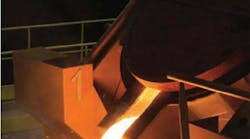The U.S. Environmental Protection Agency reports that the complaints concerning violations of federal hazardous waste regulations against two metal foundries in southeastern Pennsylvania have been settled in separate consent agreements.
Buck Company Inc, Quarryville, and Excelsior Brass Works in Blandon, were cited under the Resource Conservation and Recovery Act (RCRA), the federal law the oversees treatment, storage, and disposal of hazardous waste.
Buck will pay a $44,880 penalty for alleged violations; and Excelsior’s parent Kief Industries, Inc. will pay a $13,358 penalty. The settlements reflect the companies’ good faith and cooperation toward resolving the complaints, and as part of the settlements, the firms neither admit nor deny liability for the cited violations. EPA previously ordered both companies to comply with applicable hazardous waste regulations.
U.S. EPA and Pennsylvania Dept. of Environmental Protection inspectors on March 25, 2003, cited Buck Co. on March 25, 2003, for alleged violations, including several instances of storing hazardous waste without a RCRA permit beyond the allowable 90-day limit. The inspectors noted hazardous baghouse dust on the ground near the dust collection containers. EPA also cited an open container of hazardous waste and storing hazardous waste in a manner that didn’t allow for inspection or quick response to emergency. Also, the company allegedly failed to maintain records of employee training in hazardous waste handling, storage, and disposal.
During inspection sat Excelsior Brass Works on September 25 and October 29, 2002, EPA inspectors cited the facility for storing an estimated 11,000 kg of zinc oxide sludge (a hazardous waste containing lead and cadmium) in 92 55-gal drums. The drums had been stored on the plant site since 1998. (Zinc-oxide sludge is a by-product of Excelsior’s ingot melting practice.)
Kief Industries as cited “for storing ZOS without a RCRA permit beyond allowable accumulation periods, for failing to properly label or date drums containing this waste, and for failing to prepare hazardous waste manifests when this waste was shipped to a reclamation facility,” EPA stated.



